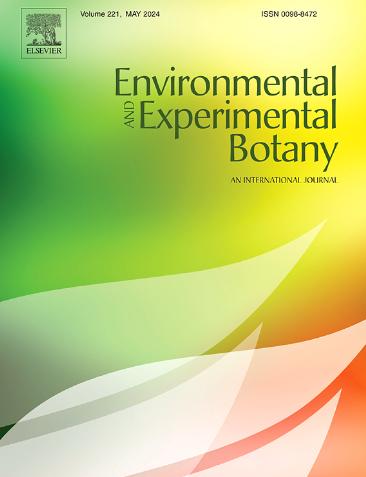综合生理、转录组和根瘤微生物群落分析揭示木竹对镉毒性的高耐受性
IF 4.5
2区 生物学
Q2 ENVIRONMENTAL SCIENCES
引用次数: 0
摘要
镉(Cd)会破坏植物的生理功能并影响土壤微环境。以往的研究表明,木本竹类对镉有很强的耐受性,但其潜在机制仍不清楚。楠竹是一种著名的木本竹类,在中国西南部和东南亚生产价值极高的竹笋。为了分析D. brandisii对镉胁迫的耐受机制,在模拟盆栽实验中,将D. brandisii置于不同浓度的镉胁迫下,分析其生理、基因表达和根瘤微生物结构的变化。结果表明,根部是镉积累的主要部位。透射电子显微镜(TEM)显示,过量的镉会导致植物器官细胞超微结构受损,如叶绿体结构异常和细胞壁变形。根据转录组分析,确定了一些关键的 DEGs 及其参与途径,如金属转运体,它们在镉耐受性中发挥着关键作用。此外,镉会明显影响土壤的 pH 值,并进一步影响微生物群落结构。在镉胁迫下,变形菌和子囊菌的丰度增加可能会促进 D. brandisii 对镉的耐受性。总之,D. brandisii 的生理特性和有益根瘤微生物可能会提高这种竹子的镉耐受性,这意味着木竹是一种很有前景的环境恢复植物。这些结果为进一步研究耐镉多功能基因和根瘤微生物群落的选择性变化提供了重要信息。本文章由计算机程序翻译,如有差异,请以英文原文为准。
Integrated physiological, transcriptomic and rhizospheric microbial community analysis unveil the high tolerance of woody bamboo Dendrocalamus brandisii under cadmium toxicity
Cadmium (Cd) can disrupt the physiological functions of plants and affect the soil microenvironment. Previous studies have demonstrated the strong Cd tolerance of woody bamboo species, but the underlying mechanisms remain unclear. Dendrocalamus brandisii is a famous woody bamboo produces highly valued bamboo shoots in SW China and Southeast Asia. To analyze D. brandisii's tolerance mechanisms to Cd stress, changes in physiology, gene expression, and rhizosphere microbial structure were analyzed in a simulated pot experiment, by exposing D. brandisii to different Cd concentrations. According to the results, the roots are the main sites for Cd accumulation. Transmission electron microscopy (TEM) demonstrated that excess Cd induced damage to plant organ cell ultrastructure, as chloroplast structural abnormalities and deformations in cell walls. Based on transcriptome analysis, some key DEGs and their involved pathways, such as metal transporters were identified to perform crucial roles in Cd tolerance. In addition, Cd significantly affects soil pH and further influences microbial community structure. Under Cd stress, the increased abundance of Proteobacteria and Ascomycota likely facilitated Cd tolerance in D. brandisii. Overall, the physiological characteristics of D. brandisii and beneficial rhizospheric microbes may improve the Cd tolerance in this bamboo, implying woody bamboos are a promising environment-restoration plant. These results provide important information for further research on multifunctional genes of Cd tolerance and selective changes in rhizosphere microbial communities.
求助全文
通过发布文献求助,成功后即可免费获取论文全文。
去求助
来源期刊

Environmental and Experimental Botany
环境科学-环境科学
CiteScore
9.30
自引率
5.30%
发文量
342
审稿时长
26 days
期刊介绍:
Environmental and Experimental Botany (EEB) publishes research papers on the physical, chemical, biological, molecular mechanisms and processes involved in the responses of plants to their environment.
In addition to research papers, the journal includes review articles. Submission is in agreement with the Editors-in-Chief.
The Journal also publishes special issues which are built by invited guest editors and are related to the main themes of EEB.
The areas covered by the Journal include:
(1) Responses of plants to heavy metals and pollutants
(2) Plant/water interactions (salinity, drought, flooding)
(3) Responses of plants to radiations ranging from UV-B to infrared
(4) Plant/atmosphere relations (ozone, CO2 , temperature)
(5) Global change impacts on plant ecophysiology
(6) Biotic interactions involving environmental factors.
 求助内容:
求助内容: 应助结果提醒方式:
应助结果提醒方式:


